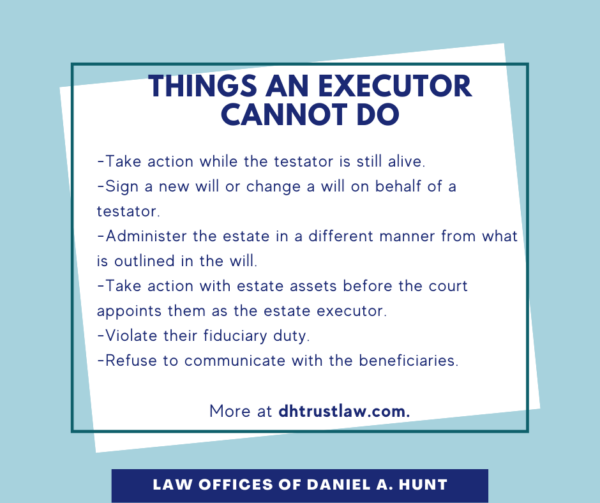What an Executor Can and Cannot Do

When a person passes away without an estate plan or with only a will, their estate must pass through the California Probate Court before it can be distributed to their heirs. If they created a will, a person called an executor is responsible for overseeing the process of administering the estate. The probate process can be long and complicated, prompting the estate heirs to wonder what an executor can and cannot do.
What an Executor Can Do
Once a California probate court appoints an executor to run the estate, they will begin managing the estate for the benefit of the beneficiaries. An executor has many responsibilities under the California Probate Code. Typical duties of the estate executor include the following:
- Finding all of the assets of the estate and taking care of the assets
- Paying any expenses necessary to maintain the assets
- Paying any income taxes that the deceased person might have owed on assets in the estate
- Paying any continuing expenses that are necessary to keep the assets of the estate secure, such as utility bills, insurance, and mortgage payments
- Paying any other types of taxes that are legally due
- Managing the day-to-day details of the estate, such as terminating leases and managing any other outstanding contracts
- Notifying any banks and government agencies of the death of the testator
- Paying any estate taxes that are due
- Supervising the distribution of assets and filing the necessary petitions with the court
- Creating an estate bank account and brokerage accounts as necessary to keep income flowing during the life of the estate.
- Supervising the process of distributing the assets
- Filing any necessary petitions with the California probate court
- Locating heirs of the testator and advising them of the status of the estate, including filing the requisite notices
What an Executor Cannot Do
The estate executor has a lot of power, but there are limits to their powers. Here are eight examples of what an executor cannot do.
1. Take action while the testator is still alive.
An executor cannot take any actions pertaining to the estate until after the testator passes away.
2. Sign a new will or change the will on behalf of the testator.
No one can sign new estate planning documents on behalf of another person, not even their executor.
3. Administer the estate in a manner that differs from the will.
An executor must administer the estate as outlined in the will. They are not allowed to change the distribution by adding in or removing beneficiaries. Even if they believe that assets should be distributed differently, the executor must follow the testator’s directions in the will.
4. Take any action as executor before the court appoints you as the estate executor.
While some basic analysis of the estate assets may be necessary to file a petition in the probate court probate, the executor cannot sell or distribute any assets until the court has approved the petition and officially appointed them as the executor.
5. Commingle personal funds with estate funds.
Executors have a fiduciary duty to keep a careful record of the estate income and expenses and avoid commingling their personal funds with the estate funds.
6. Violate their fiduciary duty in any way.
Executors have a duty to avoid any conflicts of interest or self-dealing. They have a fiduciary duty to wisely manage the estate assets.
7. Sell assets below market value without the beneficiaries’ consent.
Part of an executor’s fiduciary duty includes managing the estate’s assets in the best interests of the beneficiaries. Selling assets for less than what they’re worth – such as selling real estate at a discounted price to a friend – would violate that duty.
8. Refuse to communicate with the heirs or beneficiaries.
Executors have a duty to notify the beneficiaries of the estate administration and to communicate with beneficiaries, providing regular updates on their progress. They cannot withhold information to which the beneficiaries are entitled, such as a copy of the will. If they refuse to communicate, they risk being sued by the beneficiaries.
Can the Executor Cut A Beneficiary Out of the Will?
No, an executor cannot cut out a beneficiary who is listed in the will. Their job is to carry out the decedent’s wishes as expressed in their last will and testament. However, the executor has some flexibility in the way they distribute estate assets. For example, they may opt to sell certain property or assets in order to deal with creditors or pay for estate administration expenses, while distributing the remaining assets as outlined in the will.
If an executor is not following the will and refuses to give a beneficiary their inheritance, that beneficiary has the right to appeal to the probate court with the help of an experienced estate litigation attorney.
What If the Executor Cannot Serve?
Sometimes an executor is unable to serve. This may happen if they are:
- Deceased or incapacitated
- Unable to be located by the estate heirs or beneficiaries
- Convicted of a felony
- Have a conflict of interest
When the executor is unable to serve, the probate court will simply appoint someone else to act as the personal representative of the estate. Usually, this is a family member. The court will issue “letters testamentary,” which document authorizes the executor to act on behalf of and in the best interest of the estate.
Can a Beneficiary Seek to Replace the Executor?
If you are a beneficiary and feel like the executor is not fulfilling the duties of the job correctly, you may ask the court to remove and replace the executor. A judge will likely remove the executor from office if they:
- Waste, embezzle, mismanage, or commit fraud on the estate.
- Are not qualified to serve as executor.
- Have neglected the estate or their duties as executor.
- Have violated any law requiring removal.
The beneficiary would need to file a petition for removal with the probate court and provide evidence that the executor is unfit to serve. This is typically filed along with a petition suggesting a replacement executor. The petitioner bears the burden of proof in matters such as these.
Under California state law, you may seek the removal of an estate executor before they take action detrimental to the estate or its beneficiaries. If you have evidence that the executor is preparing to take such action, waste no time in seeking the advice of an experienced estate litigation attorney.
If you have any questions about what an executor can and cannot do, feel free to contact our law firm.
Law Offices of Daniel A. Hunt
The Law Offices of Daniel A. Hunt is a California law firm specializing in Estate Planning; Trust Administration & Litigation; Probate; and Conservatorships. We've helped over 10,000 clients find peace of mind. We serve clients throughout the greater Sacramento region and the state of California.




